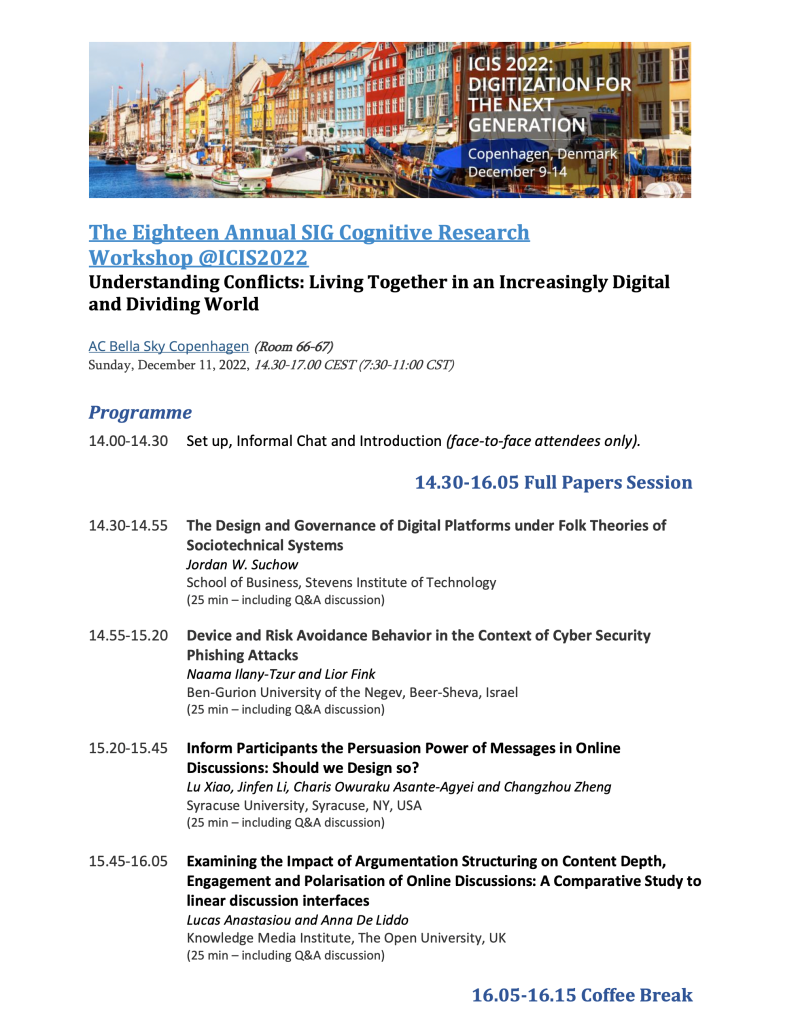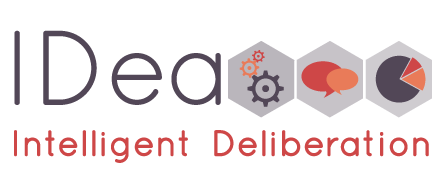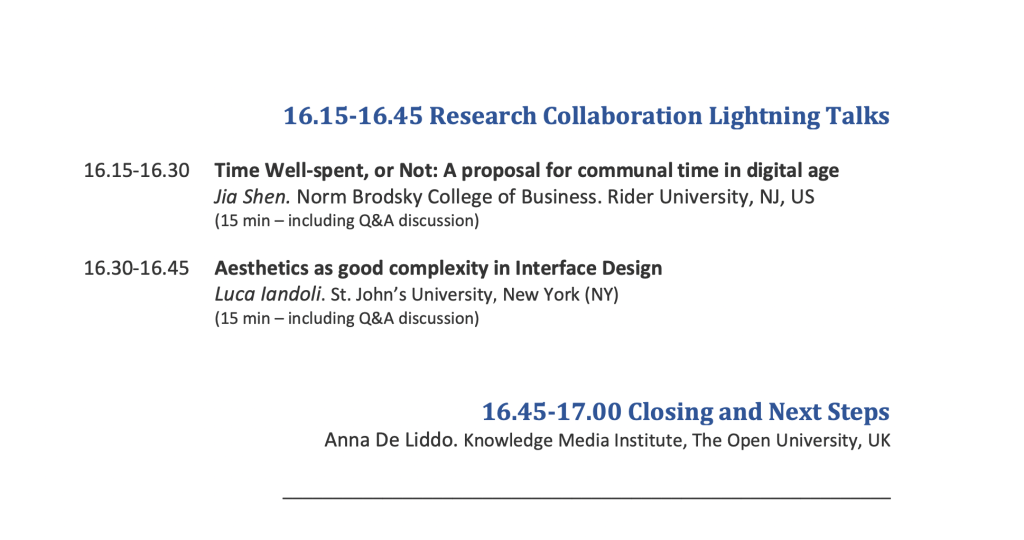Understanding Conflicts: Living Together in an Increasingly Digital and Dividing World
Sunday, December 11, 2022, 14.30-17.00 CEST (7:30-11:00 CST)
AIS Event link: https://aisnet.org/events/EventDetails.aspx?id=1679516
CFP Permalink: https://aisnet.org/members/group_content_view.asp?group=89770&id=515356
LOCATION: IN PERSON AND ONLINE
We anticipate holding the workshop in the afternoon (Copnehagen time) but will do our best to accommodate presenters’ time zones.
COST: FREE to all SIG and AIS members willing to join our SIG
Join Online @Microsoft Teams:
Click here to join the meeting
Meeting ID: 341 279 803 85 Passcode: HSZVnX
Programme

Overview
The organizing committee for the SIG Cognitive Research Workshop invites research papers for its Eighteen Annual meeting to be held during ICIS 2022 in a Hybrid format. In addressing IS research questions, these papers are expected to use theories and methods from the cognitive and psychological sciences.
The future of the Information System discipline is bound to involve human cognition as more and more systems are being used to meet our social needs. Human cognition deals with how we know things, through processes such as reasoning, perception, judgment, and emotions. SIG Cognitive Research intends to represent and support researchers in information systems who view understanding human cognition as a critical component to the successful design and implementation of information systems. As such, the questions of interest that are relevant to this SIG group focus on IS problems in terms of the process of knowing.
This year, our SIG CORE workshop proposes a focus on Cognitive IS, Positive Design, Sustainable Development, and Conflict Resolution.
In response to this year’s ICIS Conference topic “Digitization for the Next Generation” and the social unrest due to increasing, political and economical crises worldwide, we invite research contributions aimed at better understanding Digital Conflict. We look at how the increased digitalization of our society is changing the way in which alliances and conflicts are shaped. We explore the power of digital communication in affecting people positioning in conflictual situations and invite research that investigates the role of Information System design and adoption in either promoting or hindering polarization, division, and conflicts (both online and offline). In this context we are particularly interested in positive design approaches, aimed at studying IS applications that promote rather than hinder consensus building, conflict mediation, mitigation, and resolution.
Additionally, in line with AIS Grand Vision Challenge, we also welcome research that addresses the UN’s 2030 Sustainable Development Goals at large from the cognitive research and human wellbeing and development perspectives to support individual flourishing and a more peaceful and sustainable organizational growth. These topics include but are not limited to, the ones listed below.
- Cognitive Research for Conflict Understanding, Analysis, Mediation, Mitigation, and Resolution
- Cognitive Perspectives on Consensus Building and Group Negotiation
- Cognitive theories, methods and tools for Conflict Prevention, Group Agreement and Collective Decision Making
- Cognitive research for positive design, human flourishing, and sustainable organizational growth
- Creativity and creative cognition in IS design and applications
- Cognition research on emerging IT and IS technologies such as wearable technologies and exoskeletons, Virtual Worlds, and augmented reality
- Cognitive perspectives on human or computer-mediated knowledge-sharing including group problem-solving, deliberation, virtual collaboration, distributed, and team cognition
- Cognitive perspectives on decision processes and decision support systems
- Cognitive perspectives on knowledge management and representation
- Cognitive theories, methods and tools for behaviour change
- Cognitive processes of programmers/ and developers in IS design
- Research methods to investigate cognitive issues in IS
- Human factors in information environments
- Human-computer interaction or human factors perspectives involving cognition, perception, and emotion
While preference will be given to submissions within Understanding Conflict and Sustainable Development themes, the organizing committee also welcomes submissions in other cognitive research domains which can bring the community together to address crucial challenges at the intersection of Cognitive Science and Information Systems.
SUBMISSION TYPES:
Full papers: Papers should not exceed 10,000 words, including tables, figures, and references. Authors must also include an abstract not exceeding 200 words.
Short or position papers: (Student and junior faculty) Students, post-doc, and junior faculty are particularly welcome to submit papers in development, research in progress or research proposal write-ups. Research in progress and proposals will be allocated shorter presentation times but will allow students to get feedback. When you submit please indicate if you want your submission to be considered for this track. The same word limitation as for full papers applies also to this category.
SUBMISSION GUIDELINES
Send all submissions electronically to anna.deliddo@open.ac.uk with the subject line “CORE Submission”.
Before submitting, please format papers so that:
1. the first page contains only the paper title, author names, affiliations, and e-mail addresses
2. the second page contains only the paper title and abstract, without author names and identifying information is removed from the file name and properties
4. all comments are removed and changes are accepted (if using a word editor)
Papers may be submitted in MS Word or Acrobat formats. If submitting in Acrobat, please submit the title page with author information separately.
REVIEWING
Submissions will be double-blind reviewed. The organizing committee will participate in and coordinate the review process. Submitting authors agree to provide timely reviews of at most two other submissions if requested.
WORKSHOP FORMAT
The workshop is intended to serve as a showcase of leading cognitive research in information systems. There are no separate tracks or concurrent presentations. The format of the workshop is designed to enable open and constructive discussions of the research, in a spirit of collegial community-building. The workshop will run for half-day. Our business meeting will be held at the end of the workshop.
EXTENDED ABSTRACTS
This workshop is a forum to present and discuss papers to help authors publish their papers in top academic journals. To prevent copyright issues for subsequent publication, authors of accepted papers will be required to submit an extended abstract which will be made available on the SIG website through the workshop proceedings. The purpose of this extended abstract is to highlight key aspects of the papers presented for discussion. The abstract should include a synthesis of the theoretical background, methods and findings of the full paper. The extended abstract should not exceed 2 pages of single-spaced text, 1 inch margin on each side, 11 Times new roman font, including any tables, figures and references. Only authors of accepted papers will be required to submit the abstract after the notification of acceptance.
IMPORTANT DATES
Submission deadline: November 7, 2022 *(Now Nov. 15th!)
Acceptance notification: November 20, 2022
Workshop: December 11, 2022
Questions?
Contact: Anna De Liddo (anna.deliddo@open.ac.uk)
ORGANIZING COMMITTEE
Anna De Liddo, The Open University (UK), anna.deliddo@open.ac.uk, corresponding author
Lu Xiao, Syracuse University, lxiao04@syr.edu
Luca Iandoli, St. John’s University iandolil@stjohns.edu
Bob Otondo, Mississippi State University rotondo@business.msstate.edu
Jia Shen, Rider University jiashen@rider.edu
Cindy Riemenschneider, Baylor University C_Riemenschneider@baylor.edu
Emre Yetgin , Rider University eyetgin@rider.edu


